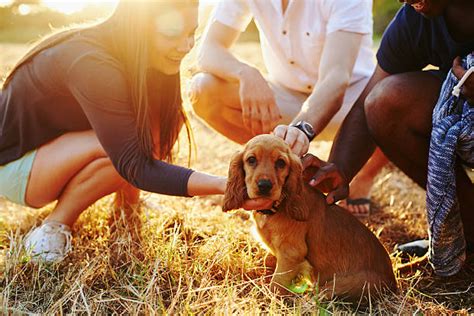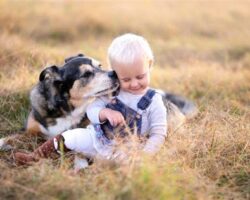As dog owners, we all want our furry companions to be happy, healthy, and well-adjusted. One crucial aspect of ensuring our dogs’ well-being is socialization. By exposing our dogs to various people, animals, and environments in a positive and controlled manner, we can help them develop the confidence and social skills they need to thrive. In this blog post, we will explore the importance of socializing your dog, the benefits it offers, and how to create a positive environment for social interactions. We’ll discuss how to introduce your dog to different people and animals, build trust through puppy playdates, utilize dog parks for socialization, and address fear and anxiety in social situations. Furthermore, we will highlight the significance of continued socialization for long-term success. So, whether you have a young puppy or an older dog, join us as we delve into the world of socializing our beloved pets.
Understanding the Benefits of Socializing Your Dog
Socializing your dog is crucial for their overall well-being and behavior. By exposing your dog to different people, animals, and environments, you are helping them develop important social skills that will make them better companions.
When you socialize your dog, you are also reducing the likelihood of behavior problems such as aggression and fear. A well-socialized dog is more likely to be calm and comfortable in various situations, making them easier to manage and less likely to develop behavioral issues.
In addition, socializing your dog can improve their overall happiness and quality of life. Just like humans, dogs thrive on social interaction and the stimulation of new experiences. By exposing them to different people and animals, you are providing them with mental and emotional enrichment that can significantly improve their well-being.
Overall, the benefits of socializing your dog are numerous and undeniable. It is an essential aspect of responsible pet ownership and can lead to a happier, healthier, and better-behaved companion.
Creating a Positive Environment for Social Interactions
Creating a positive environment for your dog’s social interactions is essential for their overall well-being. Dogs, like humans, thrive in environments where they feel safe, comfortable, and supported. When your dog is in a positive environment, they are more likely to engage in social interactions with confidence and ease.
One way to create a positive environment for social interactions is to use positive reinforcement techniques. Rewarding your dog with treats, toys, or praise when they exhibit positive social behaviors will help them associate social interactions with positive experiences. This will encourage them to seek out social interactions and be more open to meeting new people and other animals.
Another important aspect of creating a positive environment for social interactions is to manage your dog’s environment to reduce stress and anxiety. This may involve avoiding overwhelming social situations, managing introductions to new people and animals, and providing a safe space for your dog to retreat to if they feel overwhelmed. By managing their environment, you can help your dog feel more comfortable and confident in social interactions.
Additionally, consistency and routine can play a key role in creating a positive environment for social interactions. Dogs thrive on routine and predictability, so establishing a consistent socialization schedule and sticking to it will help your dog feel more secure and prepared for social interactions. Consistency will also help reinforce positive social behaviors over time.
Introducing Your Dog to Different People
Introducing your dog to different people is an important part of their socialization process. Dogs that are comfortable and well-adjusted around various types of individuals are less likely to exhibit fear or aggression in unfamiliar situations. It’s essential to expose your dog to people of different ages, genders, races, and appearances to ensure they are not only accepting but welcoming of a diverse range of individuals.
When introducing your dog to different people, it’s crucial to do so in a controlled and positive manner. Start with individuals who are calm, gentle, and have experience with dogs. Allow your dog to approach the person at their own pace and provide plenty of positive reinforcement such as treats and praise. Over time, gradually increase the level of interactions and exposure to different types of people to help your dog become more comfortable and confident in various social settings.
Another important aspect of introducing your dog to different people is to monitor their body language and behavior. If your dog shows signs of stress or discomfort, such as cowering, growling, or backing away, it’s crucial to remove them from the situation and seek professional guidance. It’s essential to ensure that every interaction is a positive and pleasant experience for your dog, as this will help to shape their long-term behavior and attitude towards others.
Ultimately, introducing your dog to different people is a continuous process that requires patience, consistency, and positive reinforcement. By exposing your dog to a variety of individuals in a controlled and positive manner, you can help them build confidence, trust, and a positive attitude towards social interactions with people of all kinds.
Building Trust through Puppy Playdates
When it comes to building trust with your new puppy, one of the most effective ways is through puppy playdates. These playdates provide an opportunity for your puppy to interact with other dogs and learn valuable social skills in a safe and controlled environment.
During these playdates, it’s important to supervise the interactions between the puppies and intervene if any aggressive behavior is exhibited. This will help your puppy to feel safe and protected during the playdate, which is essential for building trust.
Additionally, puppy playdates allow for positive reinforcement of good behavior. By rewarding your puppy for gentle and friendly interactions with other dogs, you can help to build their confidence and trust in social situations.
Overall, puppy playdates are a crucial part of the socialization process and can greatly contribute to building trust between you and your furry friend.
The Role of Dog Parks in Socialization
Dog parks play a crucial role in the socialization of our furry friends. They provide a safe and structured environment where dogs can interact with each other, learning important social skills along the way. Dogs are able to run, play, and communicate with one another, helping them to understand body language, vocal cues, and appropriate play behavior.
It is important for dog owners to expose their pets to different environments and situations in order to help them become well-adjusted adults. Dog parks offer a variety of experiences that can help to build confidence and reduce anxiety in social situations. By allowing dogs to interact with new environments and individuals, they can learn to adapt and feel more at ease when encountering unfamiliar places or people.
Additionally, dog parks allow for controlled exposure to a wide range of breeds, sizes, and ages. This helps dogs to develop social skills and learn how to communicate effectively with unfamiliar dogs. They also provide an opportunity for dogs to burn off excess energy in a healthy and stimulating way, reducing the likelihood of behavioral issues at home.
Overall, dog parks are an essential part of socializing our pets, as they provide a safe space for dogs to interact, learn, and play. Regular visits to the dog park can help to ensure that our furry friends are well-adjusted, confident, and happy members of the community.
Socializing Your Dog with Other Animals
As a responsible pet owner, it’s important to ensure that your dog is well socialized with other animals. This can help prevent aggressive behavior and fear towards other animals, making your dog more well-adjusted and happy. Socialization with other animals can include interactions with other dogs, cats, or even smaller pets like rabbits or birds.
When introducing your dog to other animals, it’s essential to start in a controlled and safe environment. This could be a neutral location where neither your dog nor the other animal feels territorial. It’s also important to supervise the interactions closely to ensure that both animals are comfortable and not exhibiting any signs of stress or aggression.
Building positive associations with other animals is key to successful socialization. Reward your dog with treats and praise for calm and friendly behavior around other animals. This positive reinforcement will help your dog feel more confident and comfortable in the presence of other animals.
It’s also important to understand your dog’s body language and behavior when socializing with other animals. Look for signs of nervousness, fear, or aggression, and be ready to intervene if necessary. It’s essential to take things at your dog’s pace and not force interactions if they seem uncomfortable.
Overcoming Fear and Anxiety in Social Situations
Many dogs experience fear and anxiety in social situations, and it’s important for pet owners to understand how to help their furry friends overcome these challenges. Dogs that are fearful or anxious in social settings may exhibit behaviors such as trembling, barking, or trying to escape from the situation. It’s crucial for owners to address these issues in a positive and supportive way.
One effective method for helping dogs overcome fear and anxiety in social situations is desensitization. This involves gradually exposing the dog to the source of their fear in a controlled and positive environment. By slowly increasing the exposure over time, the dog can learn to associate the social situation with positive experiences and reduce their fear response.
Positive reinforcement training can also be a valuable tool in helping dogs overcome fear and anxiety. By rewarding calm and relaxed behavior, pet owners can help their dogs build confidence in social situations. This can be achieved through treats, praise, and other rewards that create a positive association with social interactions.
It’s important for pet owners to be patient and understanding when helping their dogs overcome fear and anxiety in social situations. Each dog is unique and may require different strategies for overcoming their fears. With time, patience, and the right support, many dogs can learn to overcome their fears and enjoy positive social interactions.
Continued Socialization for Long-Term Success
Continuing to socialize your dog as they mature is crucial for their long-term success in various social situations. Socialization is an ongoing process that should be integrated into your dog’s routine to ensure they develop and maintain positive relationships with other dogs, people, and animals. By providing consistent opportunities for social interactions, you can help your dog build confidence and adaptability.
One way to continue the socialization process is by enrolling your dog in obedience classes, agility courses, or other structured activities. These environments provide controlled settings for your dog to engage with other dogs and people in a positive manner. Additionally, attending regular playdates with other dogs can help reinforce good behavior and reinforce positive social skills.
It’s important to expose your dog to a variety of social situations, including different environments, sounds, and experiences. Taking your dog to new places, such as dog-friendly restaurants or outdoor events, can help them become more adaptable and confident in unfamiliar settings. Introducing your dog to different types of people, including children, seniors, and individuals with disabilities, can also contribute to their overall social development.
As your dog continues to mature, it’s essential to be mindful of their individual socialization needs and to adapt your approach accordingly. Understanding your dog’s temperament and comfort level in different social situations can help you tailor their continued socialization experiences to ensure their long-term success. By consistently providing positive and enriching social experiences, you can help your dog navigate various social interactions with confidence and ease.





